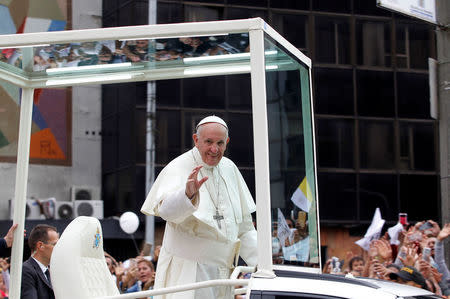On visit to Cartagena, Pope to honor 'slave of slaves' role model

By Julia Symmes Cobb and Noe Torres BOGOTA/CARTAGENA, Colombia (Reuters) - Pope Francis on Sunday pays homage to the social justice legacy of one of his role models, Saint Peter Claver, who ministered to slaves in Colombia in the 1600s, defying Spanish colonial masters who treated them as chattel. Francis wraps up his five-day trip with a stop in Cartagena, the walled Caribbean port city that was a gateway for the slave trade in the New World. There, he is expected to hammer home his message that Colombia needs to address social inequality as it struggles to nurture a fledgling peace process to end a 50-year civil war. The Spanish-born Claver, who died in 1654, is revered throughout Latin America, particularly by fellow Jesuits like Francis, for his groundbreaking work with the era's poor and marginalized. Claver begged his Jesuit superiors in Spain to send him to Cartagena so he could minister to the victims of the brutal trans-Atlantic slave trade, where African captives were bought and sold in colonial Cartagena's cobblestone streets. He boarded slave ships that arrived with their human cargo, distributing food on board and later ministering to the sick and dying in huts along the beach. Francis, who has made defense of the poor and downtrodden a major plank of his papacy, was greatly influenced by Claver's story from the days when he was a young Jesuit seminarian in his native Buenos Aires. "There are a lot of similarities that resonate with Pope Francis and this young, Latino Jesuit who has this transformative encounter with the poor," said Father Sean Salai, a Jesuit priest and author of a book about the saints who influenced Francis. Through their encounter with the poor, both men moved "into more of a direct relationship with God's people," Salai said in a phone interview from his base in San Antonio, Texas. "In a letter he called himself the 'slave of the slaves forever,' and this encounter with the poor transformed him, much like Pope Francis, who gave up on the idea of doing a doctorate in theology to be closer to the people," Salai said. While Cartagena's colonial historic district is Colombia's top tourist destination, the city, like much of the country, has deep socioeconomic and racial divisions. Poor Afro-Colombian street vendors sell coral and pearl jewelry, coconut milk and tropical fruits to tourists on the steps of the church named after Claver and where his remains are kept behind glass in the altar. Francis will pray before the remains, bless participants in two charity programs and visit a home where today's Jesuits help some 300 members of the city's poor Afro-Colombian community. "I came to receive the pope's blessing, to hear him," said Liney Galindo, 32, from northern Barranquilla. "May God enlighten him to bring a message of forgiveness, reconciliation, and wisdom to us." Francis also will meet homeless people and young girls in a Church program to prevent child prostitution in a city where young people are often victims of sex tourism and exploited by well-off locals and foreigners. Cartagena's archbishop, Jorge Jimenez, hopes the pope's presence will boost the programs. "We need to be able to expand, because here those problems are really big," Jimenez said in an interview. (Reporting by Julia Symmes Cobb; Writing by Julia Symmes Cobb; Additional reporting by Noe Torres; Editing by Philip Pullella, Helen Murphy and Jonathan Oatis)

